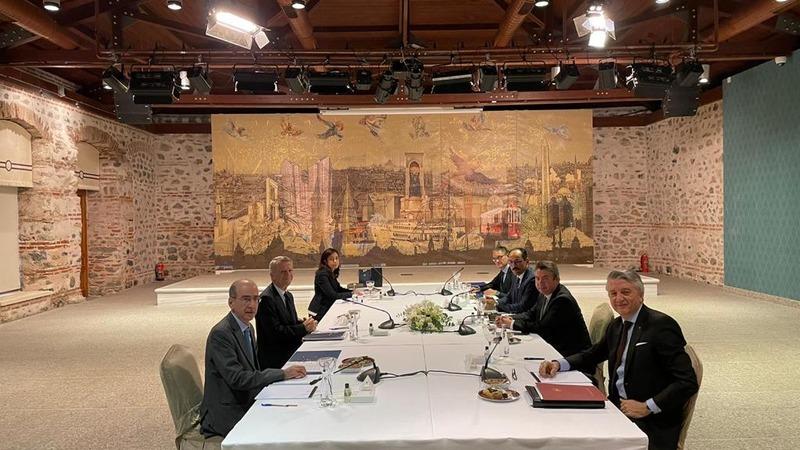Turkey and Greece resume talks on maritime disputes after five-year hiatus

Turkey and Greece resumed talks aimed at addressing long-standing maritime disputes on Monday (25 January), ending a five-year hiatus after months of tension in the eastern Mediterranean.
The neighbouring NATO members are at odds over claims to Mediterranean waters and energy rights, air space and the status of some islands in the Aegean Sea. They made little progress in 60 rounds of talks from 2002 to 2016.
Plans for resuming talks foundered last year over Turkey’s deployment of a seismic survey vessel in contested waters and disagreements over which topics they would cover. The vessel was withdrawn to Turkish shores last year.
Ankara and Athens agreed this month to resume the talks in Istanbul, in a test of Turkey’s hopes of improving its relations with the European Union, which has supported EU-member Greece and threatened sanctions on Turkey.
As the talks resumed, French Defence Minister Florence Parly said France will present proposals to Greece for the renewal of its fleet of frigates, and had finalised a €2.5-billion deal for Greece’s purchase of 18 Dassault-made Rafale fighter jets.
“Under the strong leadership of our president, the solution to all problems, including the Aegean, is possible and our will for this is strong,” said Turkish presidential spokesman Ibrahim Kalin, who was part of Monday’s talks.
Washington welcomed the talks, saying it backed efforts to reduce tension in the eastern Mediterranean. “The United States welcomes…the commitment of both governments to this process,” US State Department spokesperson Ned Price said on Twitter.
The exploratory talks are meant to reach common ground on disputed issues to allow for formal negotiations. But, despite agreeing to resume talks, Ankara and Athens still appeared to disagree over the topics to be covered in the run-up to Monday’s meeting.
Athens has said it will discuss only the demarcation of exclusive economic zones and continental shelf in the Aegean Sea and eastern Mediterranean, not issues of “national sovereignty”, while Ankara has said it wants all issues, including air space and the Aegean islands, on the table.
Greek government spokesman Christos Tarantilis said on Monday Greece was “attending the talks in good faith and expects Turkey to act similarly”, reiterating the Greek position that the talks are unofficial and focused on maritime zones only.
The agenda for Monday’s talks, which lasted more than three hours, was not disclosed. Another round of talks is expected to be held in Athens, a Greek diplomatic source said, without providing any further details.
Despite the technical disagreements, both sides voiced guarded optimism, though they were still trading barbs in the days leading up to Monday’s meetings.
Prime Minister Kyriakos Mitsotakis said last week Greece would approach the talks with optimism but “zero naivety”, while Turkish President Recep Tayyip Erdoğan said he hoped the resumption of talks would herald a new era.
According to analysts, Erdoğan is trying to break his isolation facing a hostile US administration by mending EU relations.
 Latest news
Latest news Latest news
Latest newsRomania Modernizes Ground Forces Training with Cubic Defense: A Step to Strengthen NATO’s Eastern Flank
20.Feb.2026
Greece Plans to Exclude Turkiye from Future Defense Contracts
20.Feb.2026
U.S.-Based Mars Launches Major Investment Project in Kazakhstan
20.Feb.2026
Parliamentary Elections 2026 in Armenia as a Geopolitical Referendum
20.Feb.2026
Russia and Ukraine Fail to Reach Agreement in Geneva
19.Feb.2026
The South Caucasus in U.S. Foreign Policy: Implications of High-Level Visits for Russian and Chinese Regional Aspirations
18.Feb.2026
Ukraine Imposes Personal Sanctions on Belarusian President Alexander Lukashenko
18.Feb.2026
72% Against the Authorities: Economic Dissatisfaction Hits Record Levels in Turkiye
17.Feb.2026
Bulgaria Strengthens Defense: First American Stryker Vehicles Delivered
17.Feb.2026
Moscow Criticizes Plans to Build a U.S.-Backed Nuclear Power Plant in Armenia
16.Feb.2026

 01 Mar 2026
01 Mar 2026









